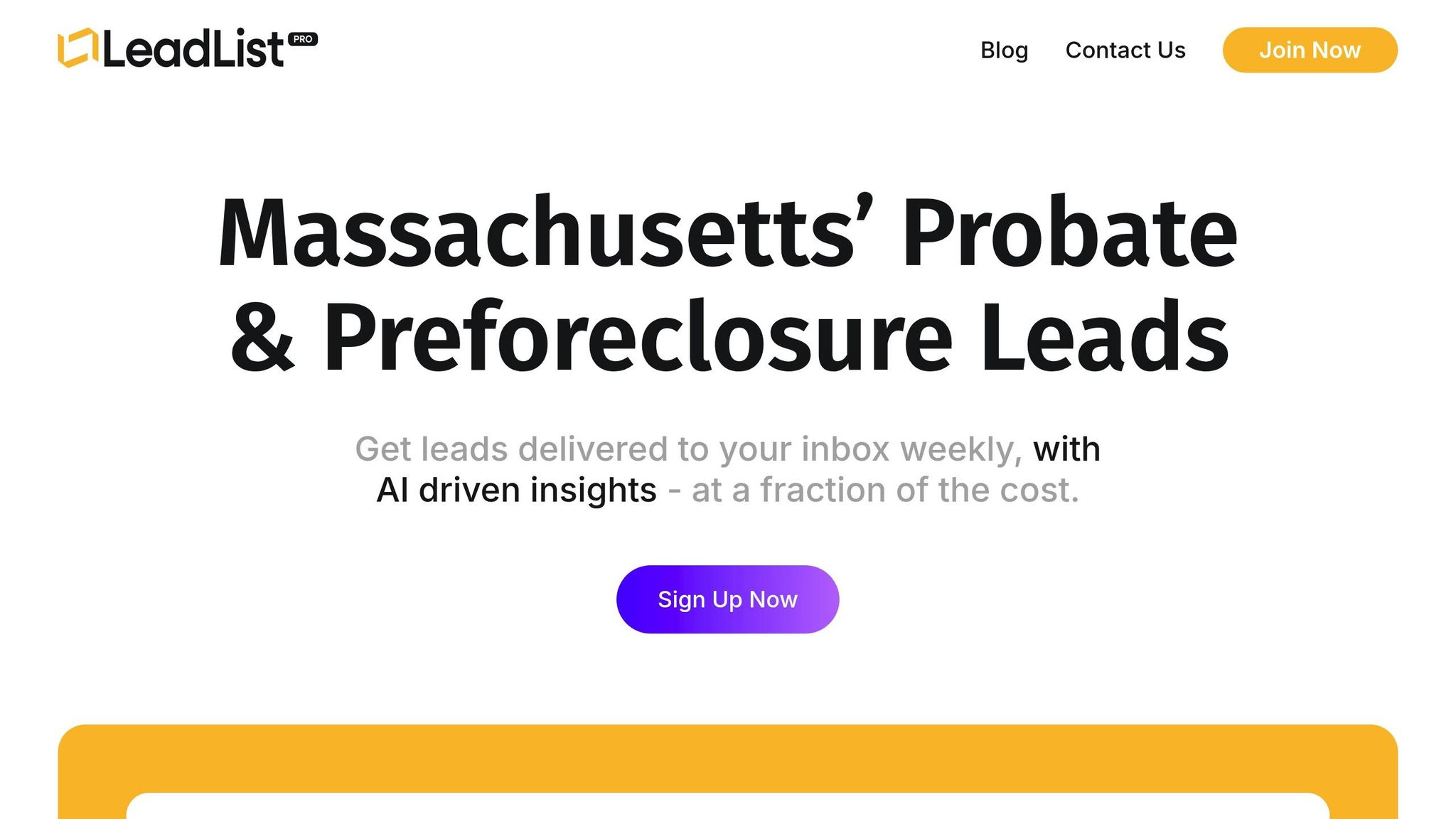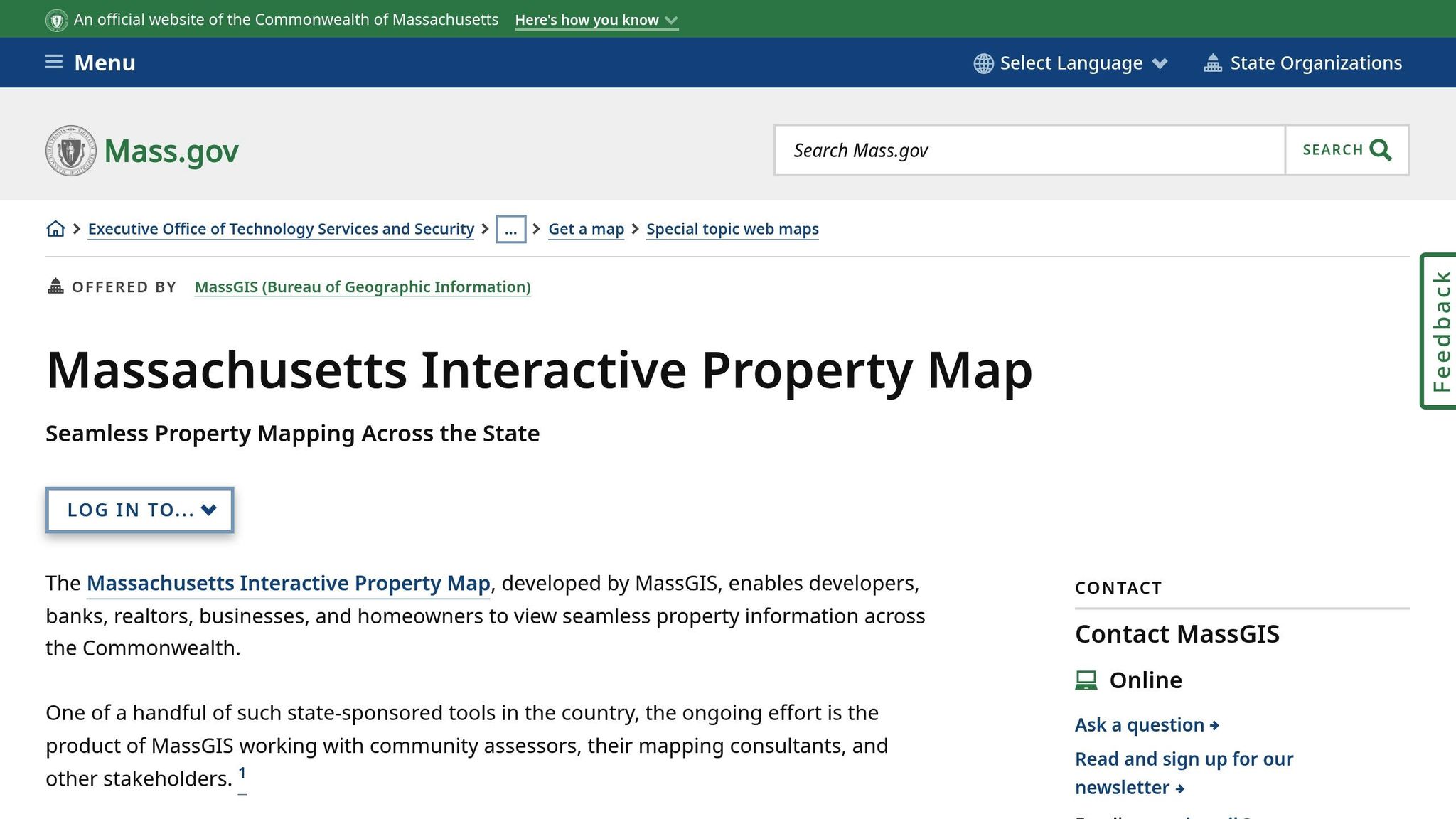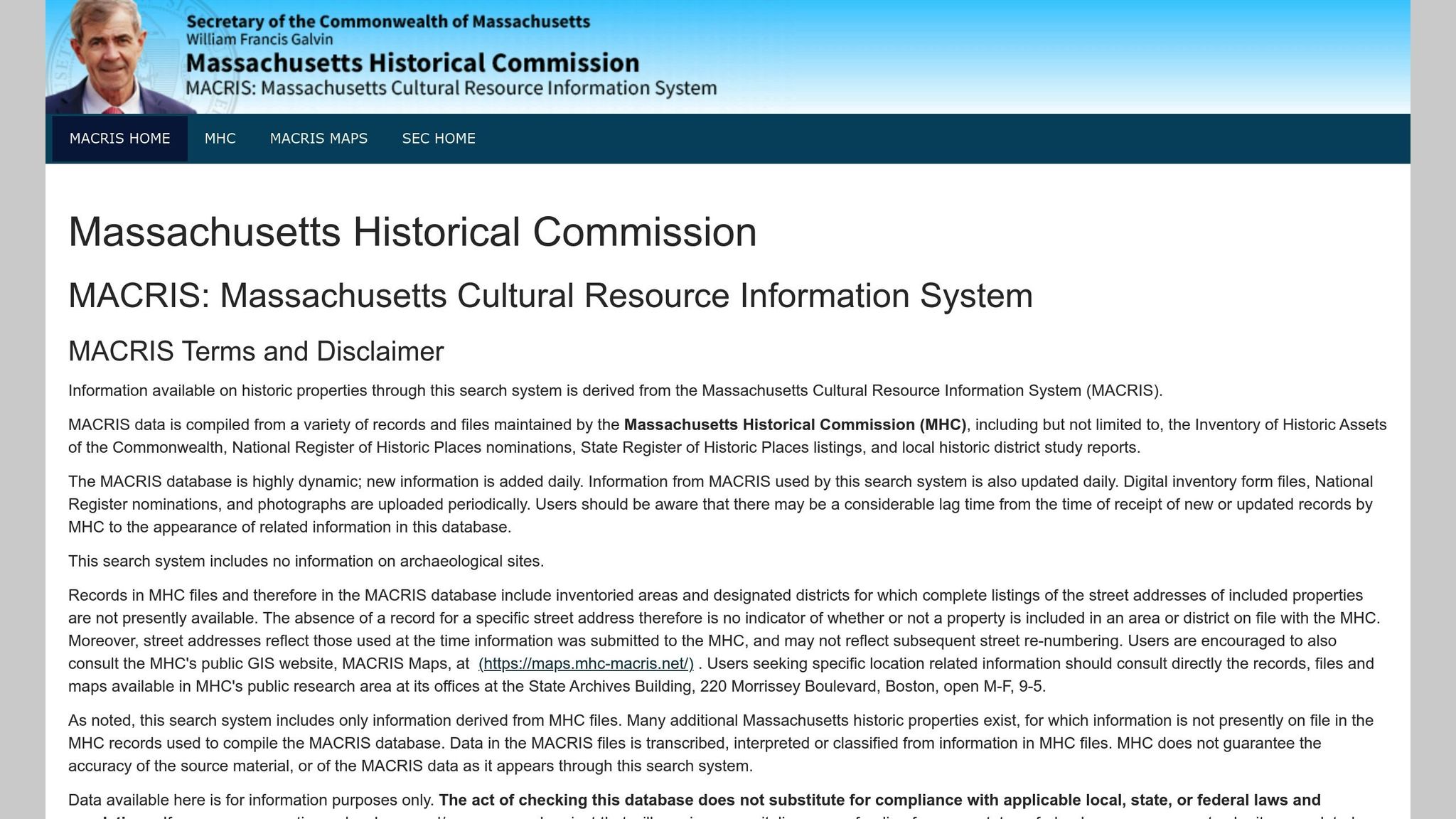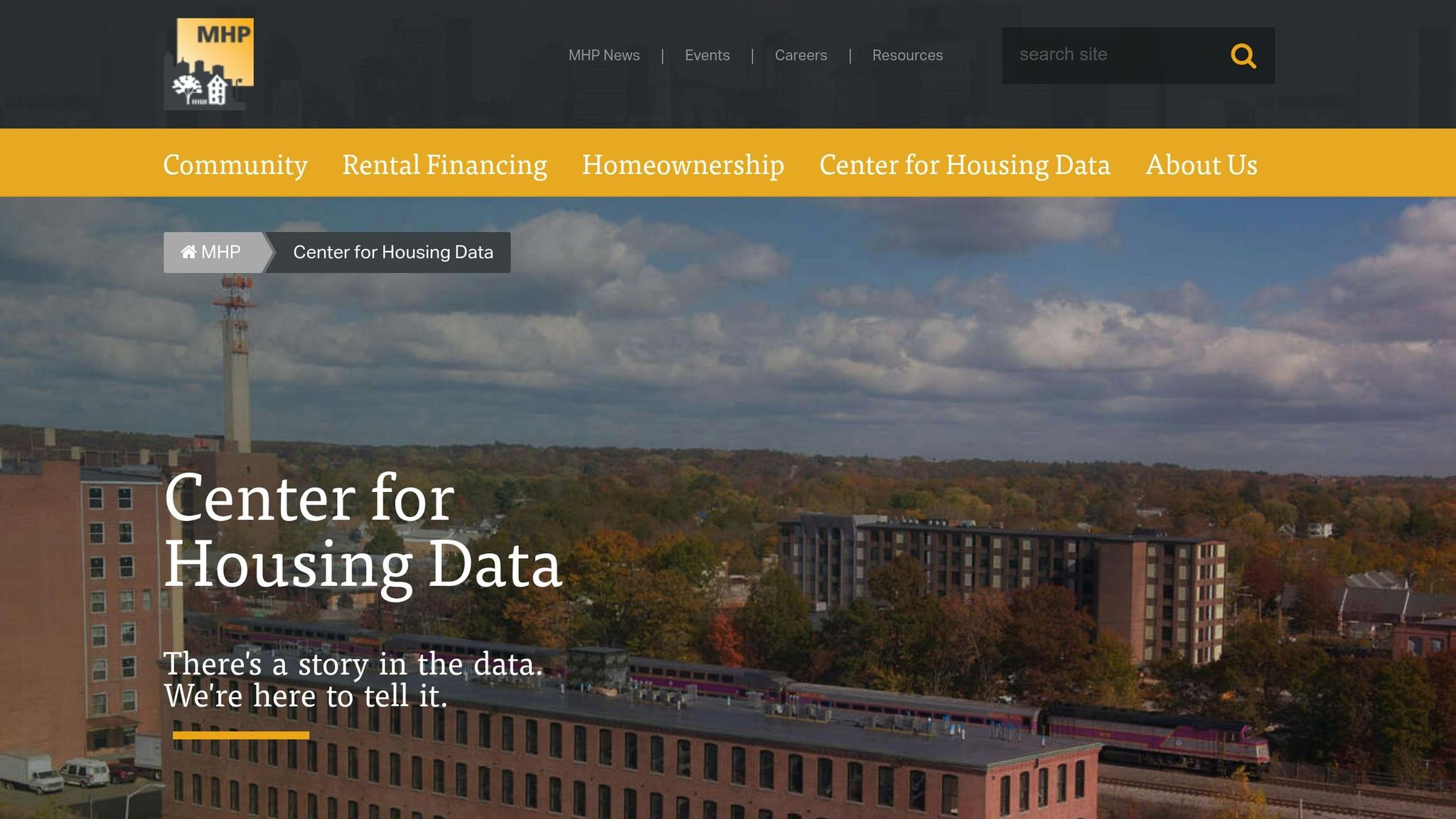6 Tools for Massachusetts Property Research
Navigating Massachusetts' real estate market can be tough, especially if you're exploring probate or preforeclosure properties. To save time and make informed decisions, here are six tools that simplify property research:
- LeadList.Pro: Focused on probate and preforeclosure leads, with AI distress scores and verified data. Plans start at $99/month.
- Massachusetts Interactive Property Map: Free tool offering statewide property boundaries, assessor data, and mapping features.
- Registry of Deeds Online Portals: Access official property records like deeds, titles, and liens for free or low cost.
- MACRIS: Free database for historic property and cultural site details across the state.
- Residensity Platform: Analyzes housing density and zoning data for development insights.
- Nexis for Real Estate: Comprehensive research tool with 81 billion public records, ideal for due diligence.
Quick Comparison
| Tool | Best For | Cost |
|---|---|---|
| LeadList.Pro | Probate/preforeclosure leads | $99–$249/month |
| Massachusetts Interactive Property Map | Property lookups & mapping | Free |
| Registry of Deeds Portals | Legal document research | Free to low cost |
| MACRIS | Historic property research | Free |
| Residensity Platform | Housing density & zoning insights | Varies |
| Nexis for Real Estate | Comprehensive due diligence | Professional pricing |
These tools cater to different research needs, from free statewide resources to premium platforms for advanced insights. Choose based on your investment focus and budget.
How Do I Search the Massachusetts Registry of Deeds Online? Mass Land Records | Ask Charles Cherney
1. LeadList.Pro

LeadList.Pro is a specialized platform tailored for Massachusetts investors targeting probate and preforeclosure deals. Unlike broader property research tools, it zeroes in on off-market opportunities specific to the Massachusetts market. This niche focus provides investors with precise, actionable data, helping them stay competitive in a demanding environment.
Access to Reliable and Current Property Data
LeadList.Pro ensures that investors receive accurate, up-to-date information to make quick, informed decisions. The platform sends weekly leads directly to your inbox in CSV format, sourced from real-time data streams. What sets it apart is the manual verification process for each probate case, confirming property ownership. This means investors avoid wasting time on dead-end leads and can focus on genuine opportunities. By addressing the challenges of probate and preforeclosure investments, LeadList.Pro simplifies a typically time-sensitive process.[2]
Samuel S. from SRS Cash Home Buyers shared his experience:
"The leads are accurate and the distressed scores have been a huge help in figuring out which ones to go after first. Plus, it's way less expensive than other services."[2]
Features Designed for Massachusetts Investors
The platform employs AI and Google Street View to assign distress scores, allowing investors to quickly identify high-potential properties. It also consolidates critical information - like decedent details, property and mailing addresses, and attorney contact data - into one convenient source. For added flexibility, LeadList.Pro offers county-specific pricing, with plans starting at $99/month for smaller counties and going up to $249/month for areas with higher activity.[2]
Easy Integration into Real Estate Workflows
With leads delivered in a CSV format, importing them into existing CRM tools or spreadsheet applications is seamless. This makes sorting and filtering based on individual criteria straightforward. Cody D. from Clover Contracting described how it improved his process:
"Previously, using a virtual assistant to compile probate leads proved costly and inefficient."[2]
Benefits for Lead Generation and Investment Strategies
By focusing on off-market properties, LeadList.Pro gives investors early access to deals that haven’t yet reached traditional MLS listings. This approach enhances lead generation, streamlines property valuation, and speeds up decision-making in probate cases where timing is critical. The distress scoring system helps prioritize outreach, reducing wasted effort and improving conversion rates. Whether you're into fix-and-flip projects, wholesaling, or buy-and-hold strategies, LeadList.Pro’s focus on properties with equity ensures more accurate valuations and faster, more confident investment decisions.
2. Massachusetts Interactive Property Map

The Massachusetts Interactive Property Map is a powerful tool for anyone diving into property research, especially when it comes to probate and preforeclosure investments. Developed by MassGIS, this state-sponsored platform offers a comprehensive, statewide view of property data. It’s gained impressive traction, with nearly 2,000 launches daily[6] and over 10 million total views to date[5]. Let’s break down how this tool stands out and supports property analysis across Massachusetts.
Access to Reliable, Up-to-Date Property Information
This map provides detailed property boundaries for all 351 cities and towns in Massachusetts, pulling data directly from municipal assessor databases[3]. With annual updates from MassGIS, users can trust they’re working with current information - critical for time-sensitive decisions.
Clicking on a parcel opens up a wealth of details, including land valuation, owner information, and the fiscal year of the data[3]. For the most precise and recent updates, users can visit individual city or town websites and search for resources like "Online Assessing" or the Assessor's Office[4].
Advanced Tools for Massachusetts Property Research
Beyond its dependable data, the platform offers tools that make property analysis more efficient. Users can:
- Measure distances between properties.
- Switch between various background views, including multi-year aerial imagery and USGS topographic maps.
- Download parcel data by city or town for external GIS analysis[3].
These features are tailored to meet the unique needs of property researchers and investors in Massachusetts.
Benefits for Real Estate Professionals and Investors
Real estate professionals have embraced this platform for its practicality. In fact, over 40% of its users come from the private sector[6]. A Senior Vice President of Development from a prominent Metrowest Boston company shared their experience:
"In a world of connectivity, the commercial real estate industry is behind the trend of aggregating and organizing information. MassMapper is a unique resource that offers a statewide approach for the management of information on real assets. Environmental, political, and terrain data, along with ownership details, overlay on a single map interface. We are weekly users of MassMapper because it saves time, connects otherwise disparate information, and, ultimately, [we] trust its sources."[6]
The ability to layer multiple types of data on one map makes this tool especially useful for specialized investment strategies. For traditional real estate investors, the statewide coverage eliminates the hassle of navigating separate municipal systems when researching properties in different areas. This streamlined approach simplifies property screening and market analysis, making it an invaluable resource for anyone in the field.
3. Registry of Deeds Online Portals
The Massachusetts Registry of Deeds online portals serve as the official gateway to property records across the state. With 21 registry districts covering every community in Massachusetts, these portals manage and store hundreds of thousands of documents annually[8]. Each district is overseen by an elected Register of Deeds, who ensures accurate and detailed transaction records within their jurisdiction[7].
Access to Property Records and Research Tools
These portals are built on a robust system, assigning a unique sequential number to every document - complete with book and page references - before scanning it into the digital database[7]. The Massachusetts Land Records website simplifies access by consolidating records from all 21 districts. Users can conduct searches using various criteria, such as first and last names, business names, document types, towns, and recording dates[9]. Additionally, searchable indexes include property addresses and names of involved parties, making it easy to locate specific records[7]. Key documents available include titles, deeds, mortgages, releases, and liens[8]. With 80–90% of Massachusetts land falling under the recorded land system[9], these portals cover most property research needs.
Streamlining Real Estate Workflows
These digital systems integrate seamlessly into real estate workflows. Records are archived in multiple formats, ensuring reliability and accessibility. This infrastructure supports critical decisions in areas like probate proceedings and preforeclosure investments.
Benefits for Probate and Preforeclosure Investors
For those involved in probate and preforeclosure investments, the portals provide instant access to crucial property documents. The sequential numbering and recorded dates allow investors to track transaction timelines and identify potential opportunities. Since Massachusetts property records are public[9], investors can perform thorough due diligence without legal hurdles. By analyzing these records, researchers can create detailed property profiles, aiding in well-informed decision-making. The extensive indexing and systematic organization make it particularly useful for tracing ownership histories - an essential step when dealing with distressed properties or navigating complex probate cases.
4. MACRIS (Massachusetts Cultural Resource Information System)

MACRIS is Massachusetts' go-to database for historical and archaeological property details, managed by the Massachusetts Historical Commission (MHC). It houses records for over 216,000 historic and archaeological sites across the state[12]. Massachusetts also boasts around 4,250 National Register of Historic Places listings, covering more than 73,000 properties, many of which can be explored through MACRIS[12]. This wealth of data is the backbone of MACRIS’s specialized tools.
Specialized Features for Massachusetts-Specific Property Research
MACRIS pulls from a variety of sources, including the Inventory of Historic Assets of the Commonwealth, National Register of Historic Places nominations, State Register of Historic Places listings, and local historic district study reports[10]. It provides spatial data - points and polygons - that map out buildings, burial grounds, structures, objects, areas, and districts. Each entry includes details like the historic name, address, construction year, architectural style, and significance[13]. The MACRIS Maps feature allows users to search by location and visually explore historic resources in specific areas[11].
The database is updated daily, though occasional delays may occur[10].
How MACRIS Fits Into Real Estate Workflows
MACRIS’s location-based search makes it easy to incorporate historic property data into real estate activities. It helps users quickly identify properties with historic designations, such as National Register listings, Local Historic District classifications, or Massachusetts Historic Landmark status. This information is crucial for evaluating property value and understanding renovation requirements. Always verify details with MHC records[13][10]. For projects involving modifications or permits, MACRIS also offers guidance on submitting a Project Notification Form (PNF) to the MHC[10].
Benefits for Investment Strategies
Investing in historic properties comes with its own set of challenges and opportunities. MACRIS helps investors identify properties with historic designations, allowing them to anticipate potential regulatory hurdles and assess valuation impacts early in the process. This foresight can save significant time and money. Additionally, MACRIS highlights historic districts, offering insights for developing a focused investment portfolio.
sbb-itb-fc184bb
5. Center for Housing Data's Residensity Platform

The Center for Housing Data's Residensity Platform is Massachusetts' go-to tool for analyzing housing density. It processes over 2.16 million property records to create a searchable database that spans the entire state, offering an in-depth view of residential density. By calculating the number of residential units per acre for each parcel, this web-based platform provides investors with detailed insights into development opportunities and market trends[14].
Access to Reliable and Current Property Data
Residensity ensures users have access to up-to-date information by refreshing its data multiple times a year[14]. This platform doesn’t just deliver density statistics; it also breaks down land use, helping investors zoom in on specific neighborhoods. An interactive map showcases density and land-use patterns across the state, while its export feature allows users to generate PDF maps and data tables for further analysis[14].
Tailored Features for Massachusetts Property Research
Residensity goes beyond basic analysis by comparing current housing conditions to zoning limits, flagging the most densely populated areas for a more focused review[14][15].
This tool is especially valuable for navigating Massachusetts' diverse housing market. For instance, the median price for a single-family home in 2024 reached $609,900, with Boston properties averaging around $900,000[15]. By offering insights into zoning compliance and development potential, Residensity makes it easier to identify investment opportunities in such a competitive environment.
Seamless Integration with Real Estate Practices
Residensity’s precise metrics are designed to fit smoothly into real estate professionals’ workflows. Its location-based density analysis complements traditional property research, enabling users to quickly determine if a property complies with zoning regulations, identify underused parcels, and assess development opportunities before making investment decisions.
Boosting Investment Strategies with Data-Driven Insights
With Residensity, investors can identify land that’s either efficiently utilized or ripe for higher-density development[15]. The platform helps professionals uncover underutilized parcels in high-demand areas, offering a clear, data-backed perspective on zoning compliance and development potential. This makes it a powerful tool for shaping smarter, more informed investment strategies.
6. Nexis for Real Estate

For property investors in Massachusetts, Nexis for Real Estate offers a powerful tool designed to streamline research and due diligence. This platform pulls together a staggering 81 billion public records from over 10,000 sources across the country [1]. With detailed profiles on 75 million executives and 80 million companies, it’s an invaluable resource for those looking to make informed decisions in the Massachusetts real estate market.
By consolidating scattered public records into one searchable platform, Nexis eliminates the need to comb through multiple county websites or government portals. Users can quickly access property records, ownership histories, and related business information - all from one centralized system. This not only saves time but also ensures consistency in the data, a critical factor when evaluating properties in Massachusetts.
Access to Comprehensive and Reliable Property Data
The LexisNexis Property Data system pulls its information from a wide range of public records, providing standardized data on a national scale [16]. This is especially helpful for Massachusetts investors, as it reduces the inconsistencies that often arise when relying on data from various municipal sources. Beyond basic property details, Nexis includes financial insights such as judgments, liens, and bankruptcies [1]. These additional layers of data allow investors to pinpoint distressed properties and uncover potential opportunities that might otherwise go unnoticed.
Advanced Features for Targeted Research in Massachusetts
One standout feature of Nexis for Real Estate is its Smartlinx technology, which uncovers hidden connections between people, businesses, and properties [1]. With built-in filters that automatically tag relevant documents, users can quickly zero in on the information that matters most [1]. This is particularly useful for investors targeting specific property types or geographic areas within Massachusetts.
"By-pass the inevitable dead-ends and paywalls with Nexis for Real Estate." [1]
User-Friendly Integration for Real Estate Professionals
The platform has earned high praise for its intuitive design and ease of use. Real estate professionals often highlight how seamlessly it integrates into their daily workflows. As one associate shared:
"Nexis is vital to my business in searching for owner, property, and business information. I use it daily and recommend it for its ease of use and seamless integration."
- Hannah J., Associate [17]
Nexis supports both natural language and Boolean search options, catering to varying levels of user expertise [1]. Whether you’re a seasoned researcher or a newcomer, the platform’s flexibility ensures you can extract valuable insights with minimal effort. These features make it easier for investors to focus on strategic, data-driven decisions.
Real-World Benefits for Lead Generation and Investment Strategies
A January 2025 Forrester Consulting study found that Nexis delivered an impressive 110% ROI and $1.20 million in net present value over three years, significantly enhancing research and strategy efforts [17]. For Massachusetts property investors, the platform shines in lead generation, leveraging over 40,000 news sources to spot emerging opportunities and track market trends [1]. Its financial insights complement valuation strategies, while its extensive database of executive and company information helps investors connect with key decision-makers in both commercial and off-market residential transactions.
Tool Comparison Chart
Here’s a comparison of six tools tailored for Massachusetts property research, focusing on their data sources, features, use cases, coverage, and pricing:
| Tool | Primary Data Sources | Key Features | Best Use Case | Coverage | Pricing Range |
|---|---|---|---|---|---|
| LeadList.Pro | Massachusetts probate courts, preforeclosure filings | AI distress scores, verified data, weekly CSV delivery | Probate and preforeclosure lead generation | All 14 Massachusetts counties | $99–$249/month |
| Massachusetts Interactive Property Map | Assessor data from 351 cities and towns | Statewide parcel mapping, property records | Quick property lookups, visual mapping | Statewide Massachusetts | Free |
| Registry of Deeds Online Portals | County deed recordings and mortgage documents | Document images, detailed ownership history | Legal document research and title verification | County-specific | Free to low cost |
| MACRIS | Massachusetts Historical Commission | Historic property data, cultural resource details | Historic property identification and compliance | Statewide Massachusetts | Free |
| Center for Housing Data's Residensity | Municipal housing data, permits | Housing development tracking, zoning insights | Development research and market trend analysis | Massachusetts municipalities | Varies |
| Nexis for Real Estate | Extensive public records | Advanced analytics and financial insights | Comprehensive due diligence and lead generation | National coverage | Professional pricing |
LeadList.Pro stands out for its focus on distressed property leads, utilizing real-time court data and manual verification to ensure high-quality information. It’s ideal for probate and preforeclosure lead generation, with pricing that starts at $99 per month for smaller counties like Dukes and Franklin and goes up to $249 per month for high-volume areas such as Middlesex and Suffolk.
For free options, the Massachusetts Interactive Property Map consolidates assessor data from all 351 cities and towns, offering a reliable tool for property lookups and visual mapping. Similarly, MACRIS provides access to historic property data, making it a go-to resource for identifying properties with unique historical considerations.
The Registry of Deeds Online Portals delivers authoritative ownership and legal document research, while the Center for Housing Data's Residensity platform offers valuable insights into housing development trends and zoning data, making it useful for market analysis.
Nexis for Real Estate provides a broader scope with its national coverage and advanced analytics, catering to those needing comprehensive due diligence and financial insights.
For investors, tools like LeadList.Pro and Registry of Deeds portals offer organized data in formats like CSV, which can be easily integrated into CRM systems. Whether you're focused on distressed properties, historic sites, or market trends, this comparison highlights the strengths of each tool, helping you choose the one that aligns with your goals.
Conclusion
Finding the right tools can make property research in Massachusetts much easier. The key is to match the tools you use with your specific investment goals and budget.
For those focusing on distressed properties, LeadList.Pro stands out by offering AI-driven distress scores and manually verified leads. Meanwhile, free resources like the Massachusetts Interactive Property Map and Registry of Deeds portals provide essential data without any recurring costs. Combining these tools allows you to cover a wide range of research needs effectively.
A well-rounded strategy often involves a mix of free and paid tools. Free options like MACRIS and the state's property mapping system offer reliable baseline data, while premium platforms like LeadList.Pro enhance your research with advanced analytics and targeted leads.
Thorough property research means diving deep into market trends, studying neighborhoods, estimating property values, and identifying comparable properties [18]. Tailor your efforts to the specific aspects of real estate that matter most to your investment goals [19], and choose tools that support a complete and detailed analysis.
Whether you're working with a $99 monthly plan for smaller counties or investing $249 for high-volume areas, these scalable tools are designed to simplify probate and preforeclosure research. They can help you make smarter decisions in Massachusetts's competitive real estate landscape.
FAQs
::: faq
How does LeadList.Pro help with probate and preforeclosure property research in Massachusetts?
LeadList.Pro makes property research easier for Massachusetts investors by offering reliable, AI-powered probate and preforeclosure leads. Each lead undergoes manual verification to ensure accuracy, giving you the confidence to spot opportunities faster.
By providing up-to-date data and practical insights, LeadList.Pro enhances lead generation, property evaluation, and acquisition planning, making it a valuable resource for navigating the Massachusetts real estate landscape. :::
::: faq
How does the Massachusetts Interactive Property Map help with real estate investment research?
The Massachusetts Interactive Property Map is a handy resource for real estate investors. It offers detailed insights into properties, such as land valuation, ownership information, and exact parcel boundaries. With this tool, you can quickly evaluate property size, location, and potential market value.
Additionally, the map lets you measure distances and land areas, which simplifies assessing whether a property aligns with your investment goals. Whether you're exploring new acquisitions or looking into probate or preforeclosure opportunities, this tool helps streamline your research and supports smarter decision-making. :::
::: faq
What kind of historical property details does MACRIS offer, and why are they valuable for investors?
Understanding MACRIS: A Resource for Historic Properties in Massachusetts
MACRIS (Massachusetts Cultural Resource Information System) provides a wealth of details about historic properties across Massachusetts. It includes architectural descriptions, historical backgrounds, inventory forms, and geographic data. This resource is invaluable for anyone looking to explore the historical significance of a property, understand preservation requirements, or evaluate its potential for development.
For real estate investors, particularly those interested in historically rich or unique properties, MACRIS data is a game-changer. It helps assess a property's historical value, ensures compliance with preservation rules, and highlights distinctive features that could boost its market appeal. In short, it’s a vital tool for making well-informed investment decisions. :::



